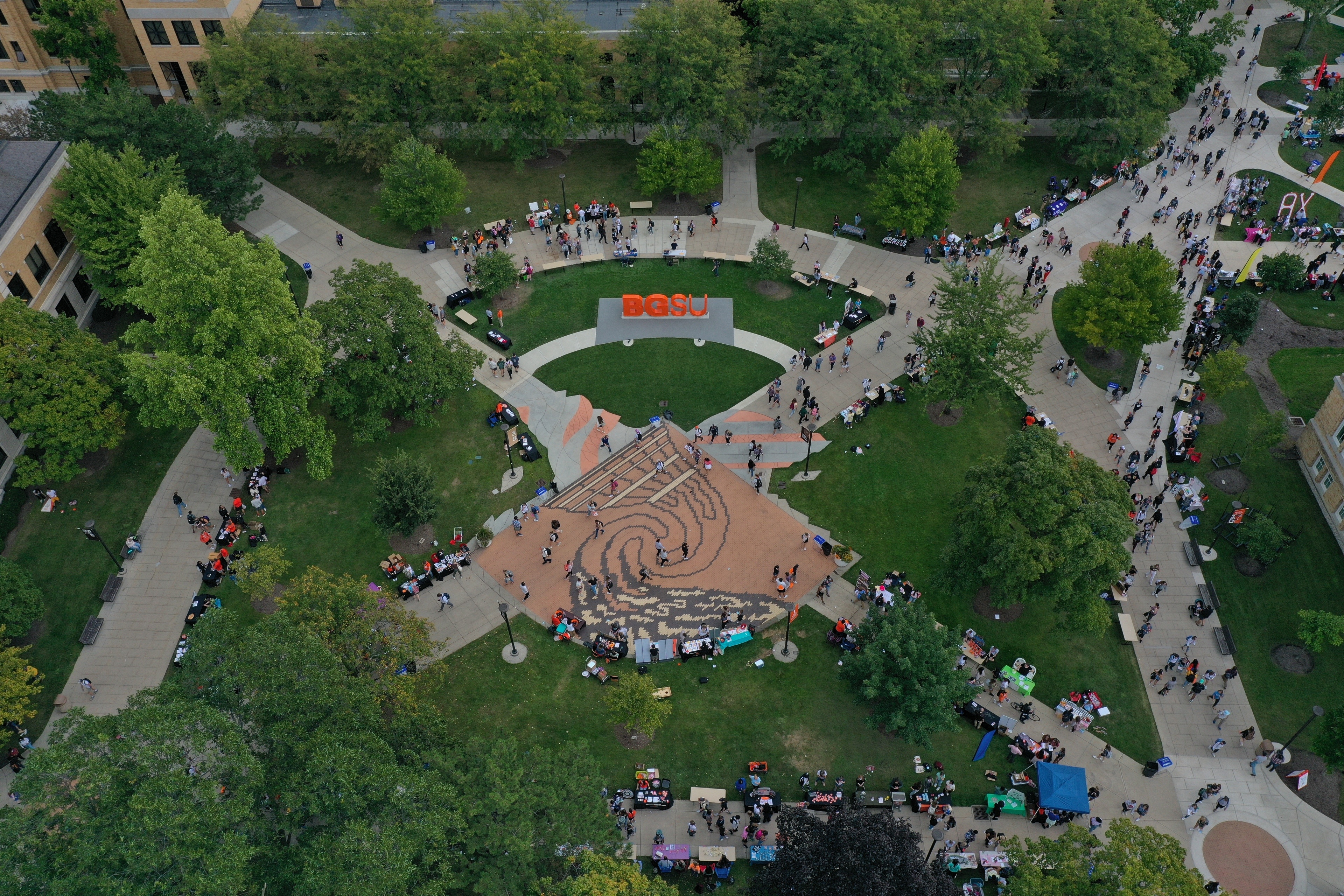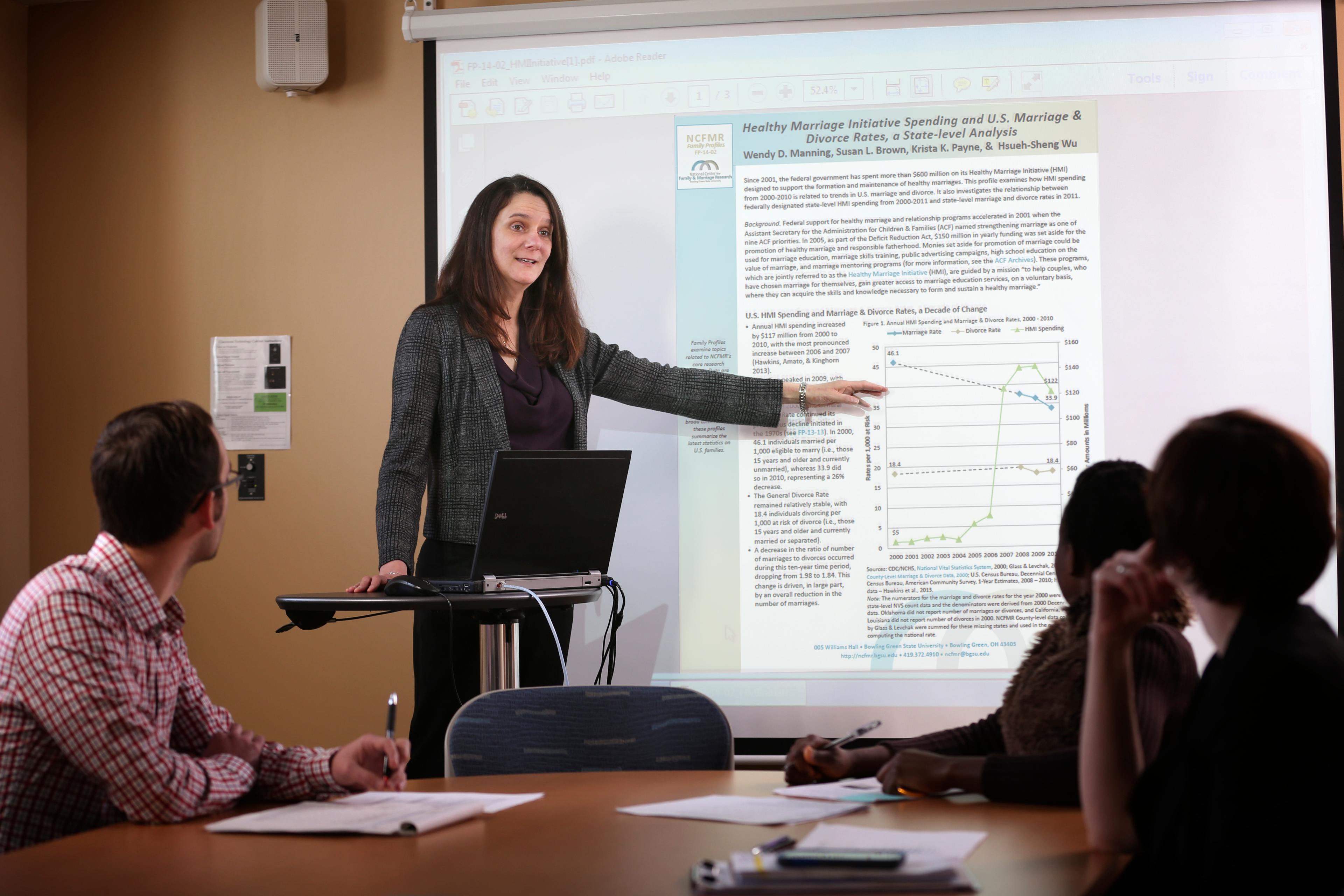Nationally recognized for student experience
The Wall Street Journal

Doctor of Philosophy (Ph.D.)
Sociology
The BGSU doctoral program in sociology provides advanced training in sociological research and teaching. Choose from four specializations: social psychology, demography, family studies and criminology.
Our well-regarded faculty has research interests that cover a wide range of sub-areas within sociology. Small classes and a friendly, informal environment allow you to have a high level of interaction with faculty.
You may enter the Ph.D. graduate program in sociology directly upon completing your undergraduate degree (earning an M.A. during the program) or after completing a master’s in sociology or a related field.
Why study sociology at BGSU in Ohio?
- National ranking. The BGSU doctoral program in sociology is ranked in the top 20 nationally by the National Research Council for our high research productivity and superior student outcomes.
- Four specializations. Choose from social psychology, demography, family studies or criminology.
- Renowned faculty. Our faculty members are acclaimed for their research and teaching. They include:
- Recent president of the Population Association of America
- Sutherland Award winner (highest honor from American Society of Criminology)
- Editor of Population Research and Policy Review
- Top contributor to work-family research
- Expert witness to federal cases on bail reform
- Author of a Supreme Court amicus brief in the landmark Obergefell v. Hodges case
- Research opportunities. Work closely with faculty on research and as research and teaching assistants. Present at conferences and co-author publications.
- Financial support. Graduate teaching or research assistantships are available and include a full tuition scholarship and a competitive stipend.
- Marketable skills. Receive advanced training in your specialization and gain cutting-edge research and data analytical skills. Learn how to teach and get experience by teaching your own courses.
- National research centers. Take advantage of two federally funded research centers on campus: the NIH-funded Center for Family and Demographic Research (CFDR) and the National Center for Family and Marriage Research (NCFMR). The centers provide:
- Research opportunities
- Colloquia series
- Statistical training
- Working groups
- Access to national datasets
- A chance to network with prominent scholars from around the country
- Supportive culture. The department thrives because of the collegial relationships between faculty, students and staff. Our active Sociology Graduate Student Association promote personal, academic and professional development; encourages scholarly collaboration and promotes the advancement of social science research.
#1 public university in Ohio for career prep
The Wall Street Journal
Career opportunities
Graduates of the doctoral sociology program have found positions in both academic and non-academic settings, including:
- Major research universities (Florida State University, Penn State University, University of Nebraska)
- Teaching-oriented and liberal arts colleges
- Government agencies (Census Bureau, Ohio Department of Health)
- Think tanks (Child Trends)
- Research centers (National Opinion Research Center)
- Private sector employers (Nielsen)
Career paths
- Demographer
- Criminologist
- Policy researcher
- Nonprofit advocacy
- Sociology research
- Post-secondary educator
- Statistician
- Survey researcher
- Market research analyst
- Medical records specialist
Quick Facts from the Bureau of Labor Statistics
Curriculum
Doctoral students in the BGSU sociology program are given flexibility in developing programs of study. All students complete a dissertation and are expected to achieve a level of competence in current theory, research methods and statistics.
Most Ph.D. students also will choose a specialization or a minor in quantitative methods.
All doctoral students are required to:
- Complete 60 semester hours of graduate course credit beyond the master’s degree. If you are admitted to the doctoral program without a master's degree, you will complete one during your course of study.
- Take six core courses in theory and quantitative methods and a teaching seminar.
- Demography - Gain insights into the complexities of population processes, including fertility, mortality/morbidity, migration and family formation. Learn about the relationships between these processes and broader social and economic contexts and trends.
- Criminology - Study the causes and consequences of crime and delinquency and the societal response to these phenomena. The program emphasizes both breadth and depth of knowledge about crime, delinquency and the criminal justice system.
- Family studies - Gain insights into the complexities of contemporary families, the historical development of family systems and the social psychological and demographic processes that influence and are influenced by family phenomena.
- Social Psychology - Focus on the reciprocal relationship between the individual and society. One of the strengths of social psychology is the scope of topics within its purview. You will graduate with valuable skills in diverse areas such as public opinion, mass communications, consumer behavior and public health.
- Quantitative methods minor - Quantitative research has become the dominant paradigm in the field for the investigation of sociological topics. Study the statistical techniques used in sociology, including analysis of variance, linear regression, regression with limited dependent variables, structural equation modeling, demographic techniques and similar topics.

Sample courses
- Classical Sociological Theory
- Statistical Techniques and Applications in Sociology
- Research Design
- Techniques of Demographic Analysis
- Human Fertility and Family Planning
- Family Theory and Research
- Gender in Families
- Sociology of Aging
- Crime and Punishment
- Deviance Behavior
#1 university in Ohio – big or small, public or private – students would choose again
The Wall Street Journal
The sociology doctoral program is a part of the Department of Sociology in the College of Arts and Sciences.
Accreditation
Bowling Green State University [BGSU] is accredited by the Higher Learning Commission. BGSU has been accredited by the Higher Learning Commission since 01/01/1916. The most recent reaffirmation of accreditation was received in 2022-2023, with our next reaffirmation of accreditation scheduled for 2032-2033. Questions should be directed to the Office of Institutional Effectiveness.
Request Information
Updated: 08/21/2025 04:38PM

